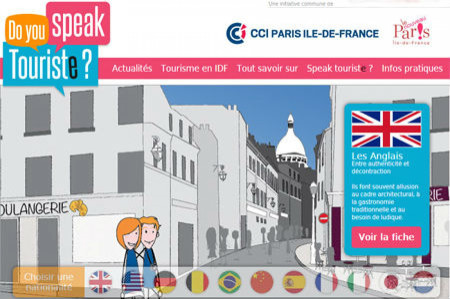Paris Launches Etiquette Campaign And Stereotypes Its Visitors In The Process

Prepare to be stereotyped. Parisian officials have embarked on a campaign to turn Paris’ famously snooty city dwellers into some of the most polite people on the planet by arming them with a six-page etiquette guide that outlines the travel habits of visitors from 11 nations.
The initiative to make the French capital more tourist-friendly comes from the Paris Chamber of Commerce and the local tourist board. Together, they’ve distributed 30,000 copies to waiters, taxi drivers, sales and hotel staff and others who deal with foreigners on a day-to-day basis and often come off as impolite.
The handbook entitled “Do You Speak Touriste?” contains greetings in eight languages and advice on the habits and cultural mores of 11 nationalities. According to its authors, Americans are “very direct” and like personalized and “rapid treatment” that takes into account all of their needs during each stage of their stay. They'll eat breakfast between 7 and 8 a.m., lunch between 12 and 1 p.m., and take dinner at 6 p.m. (which is considered way too early by Parisian standards). Most importantly, “they need to be reassured of the rates.”
Brits, meanwhile, are more playful, enjoy smiles and “like to be called by their first names.” They'll eat breakfast between 7:30 and 8:30 a.m., lunch between 12 and 1 p.m., and dinner between 6 and 7 p.m. Most importantly, “they are waiting for personalized advice and explanations.”
Other nuggets of wisdom: Germans love handshakes, while Brazilians can be very touchy. Spaniards are often in search of free things, while big-spending Japanese are “discrete but demanding” and are often nervous, constantly needing reassurances about where they’re going. Italians, the book suggests, love it when you give their children attention.
Despite the silliness of it all, France does have reason to take interest in other customs, no matter how cliché they may seem in the booklet. The nation sees more foreign tourists -- 29 million visited Paris last year alone -- than any other country. Moreover, tourism accounts for nearly one in 10 jobs in the capital region and has been a boon for Paris during tough economic times.
Part of its recent growth can be attributed to a surge in high-spending Chinese visitors. The booklet has plenty to say about them, too. They love original suggestions about where to shop (particularly for luxury brands), and “a simple smile and hello in their language will fully satisfy them.” When it comes to food and wine, however, they can be “very sensitive.”
The Paris Chamber of Commerce said its campaign is a way of keeping tourists from both established and emerging markets happy amid growing competition from seemingly friendlier European cities. The book and accompanying website, Do You Speak Touriste, are based on a simple principle: to identify the specific needs of tourists and to ensure a quality service that will ultimately increase their spending.
“The website offers more practical tools and country profiles to understand the codes of politeness and know the nature of expenditure, consumption patterns and expectations,” explained Nathalie Clement Solal, head of marketing and communication services, at the Chamber of Commerce. “We should not forget that by 2020 an additional 10 million tourists will invest in the capital region, and there are still considerable challenges.”
The Chamber’s politeness campaign is hardly the first to make waves in the City of Light. Parisians themselves, it seems, have also had enough with the attitude. Sixty percent of respondents in a recent Ipsos poll said a "lack of manners" as their No. 1 source of stress.
The Paris transport authority, Régie Autonome des Transports Parisiens, also conducted a survey last year that found 97 percent of bus and underground passengers had witnessed rude behavior, while many acknowledged the long-standing belief that the French lack certain etiquette standards in social interactions.
RATP subsequently launched a civility campaign featuring a collection of “rude” animals tormenting “civilized” humans, in hopes of shaming ill-mannered commuters into changing their ways. Ads included one with a buffalo barging onto a crowded train and another depicting a sloth taking up more than its fair share of space. A follow-up survey on the campaign found that 63 percent of respondents who had previously admitted to poor etiquette said the new ads made them think twice about their behavior.
© Copyright IBTimes 2025. All rights reserved.






















